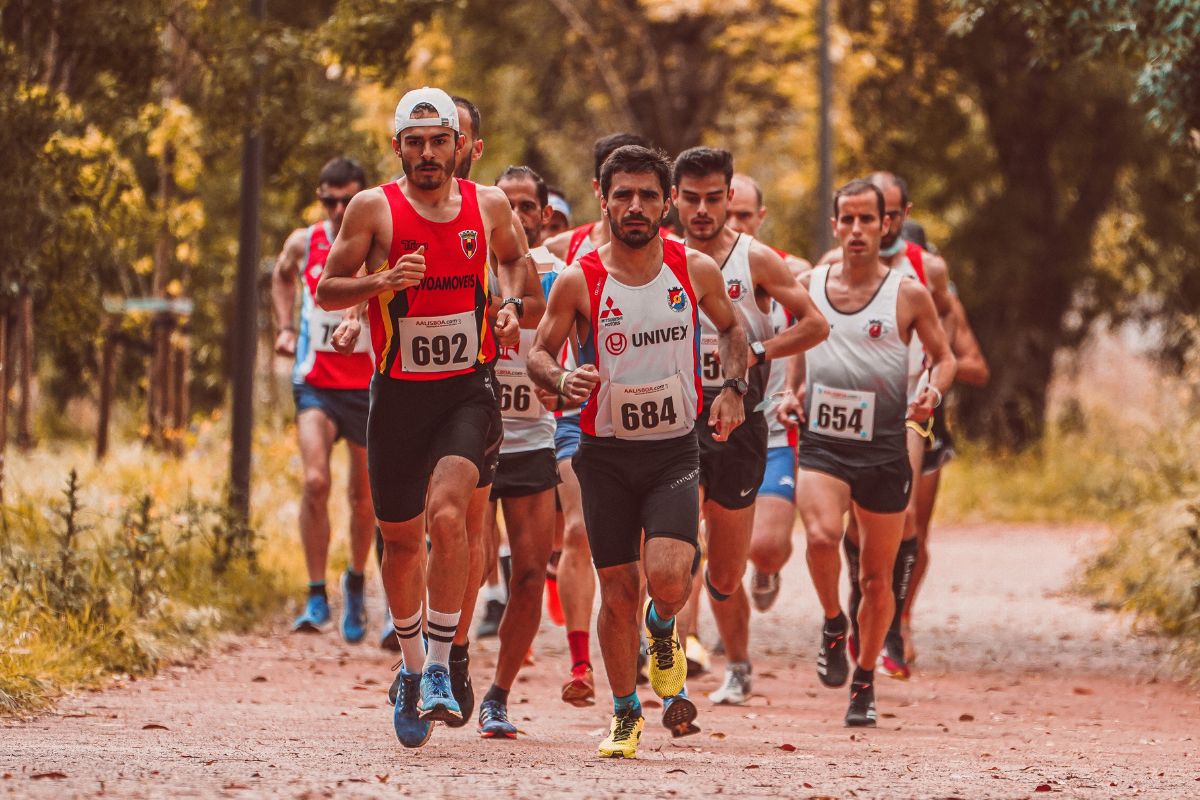Half marathons are exciting racing events that push runner’s to their limits without forcing them to run the full marathon distance.
The perfect preparation for future full-distance marathons, a half marathon consists of 13.1 miles of mental challenge and physical battle.

While anyone with the proper training can complete a half marathon, your very first race can be pretty daunting.
Your training plan alone might push you further than you’ve ever been pushed before.
With this in mind, we’d like to make things that little bit easier for you by sharing our top half marathon tips. In this article, you’ll find 11 things we wish we’d known before running our first half marathon.
The 11 things we look at should give you a better understanding of what to expect, how to prepare, and most importantly how to succeed.
We’ll even show you how to train for your first half marathon so you have everything you need to get started.
If all that sounds like something that can help you, make sure you keep reading!
Training For Your First Half Marathon
Before we show you our 11 half marathon tips, we’d like to start by looking at how you can train and prepare for your first half marathon.
We’ll start by looking at how you can train to succeed in a 21km race.
The preparation before your big race is absolutely crucial when it comes to completing a half marathon.
Without an effective training plan that you then follow to the letter T, you’ll find it incredibly difficult to complete the distance.
The type of training plan you follow can vary, with there being a wide range of different plans to choose from based on your levels of experience and the time in which you hope to complete the race.
Seen as though this article focuses on those running a half marathon for the first time, we advise following a beginner’s training plan.
Beginner half marathon training plans last between 12 to 16 weeks and consist of long runs, easy runs, speed training, and strength training.
Long Runs
Your beginner training plan should contain one long run per week. We recommend doing this run at the weekend. Saturday or Sunday are both fine.
The primary aim of the long run is to increase your stamina and endurance so that your body is ready to go the full distance when race day comes around.
To avoid becoming out of breath when doing your long run, you should aim to keep your pace at a comfortable level. This will ensure that you get the most out of the session.
Easy Runs
A beginner half marathon training plan also includes 1 to 3 easy runs per week. These are normally completed throughout the week, leaving the weekend free for rest and the long run.
Easy runs are designed to get athletes running at a comfortable pace. You should be able to easily hold a conversation when doing an easy run.
Speed Training
You’ll find that most beginner training plans make speed training optional.
While this might suit you as you don’t like speed training, we highly recommend doing at least some form of speed training as you progress because it is a fantastic way to improve overall speed and endurance.
Of course, this then gives you a much better chance of finishing the half marathon, and in good time too.
Different types of speed training your plan could include are tempo running, Fartlek training, and interval training.
Strength Training
Missing strength training out of your half marathon training plan is easily done and also a big mistake.
Every half marathon training plan needs to include at least one strength session a week. Strength training is critical when it comes to improving athletic performance and building muscle strength.
In terms of the exercises strength training entails, you can perform any bodyweight exercise. That includes lunges and squats.
You can also perform weighted exercises such as weighted lunges or dumbbell squats.
Preparing For Your First Half Marathon

Now you know what sort of things your beginner training plan will consist of, let’s take a look at how you can prepare to succeed in your first half marathon.
Getting yourself ready for the race doesn’t just include following a strict training plan.
You must also prepare for the race by ensuring you have the correct gear and by fueling your body correctly.
These are just two of the things you can do. We’ll show these two and others in more detail now!
Wear The Correct Gear
One of the most important things you need to think about before your race is the gear you need to wear.
While this may sound quite easy, you have a lot to think about in order to be prepared for every eventuality.
The gear you wear will change depending on the weather conditions and environment you find yourself running in.
If the race is going to be an extremely hot one, consider wearing a short-sleeve running top and shorts.
If it’s going to be cold, you’ll probably need a thick pair of running tights and a thick base layer.
That’s not all, you’ll also have to think about your running shoes and the terrain.
If the course is mostly flat, taking place on roads, road running shoes are acceptable. If the course is hilly and off-road, trail running shoes will be better.
Having said all this, it is still important to run in what you feel comfortable wearing. If you don’t like running in shorts, don’t!
We also recommend wearing clothes that won’t rub and chafe. Clothes that do will leave you in a lot of discomfort.
Invest In A Reliable Pair Of Running Shoes
Investing in the best pair of running shoes possible is super important. In fact, your running shoes will most likely make or break your race.
Wearing a pair of shoes that aren’t right for your feet will lead to blisters or even injury. For obvious reasons, this will make it hard for you to complete the race.
In our opinion, anyone new to running half marathons should contact a professional for help before buying their shoes. A specialist will be able to identify the best running shoes for you.
They can also measure your feet to find the perfect match. They’ll look at your foot type, gait, and the race you’re taking part in.
You will be asked a number of questions so be prepared to know the answers. You might be asked things like – how many miles do you run a week? Or are you aware of any problems?
We also recommend taking your old shoes with you. The specialist might be able to tell how you run based on how your old shoes have worn down.
Never buy your new shoes right before race day either as you’ll need time to get used to them first.
Fuel The Body Correctly
Fuelling your body correctly during training and on race day is imperative. If you don’t fuel your body correctly, you’ll quickly start to feel sluggish and tired as your body runs out of energy.
Your body will go through a lot during training and on race day, so the least you can do is keep it well-fueled. If you treat your body with kindness, it will carry you across the line.
During the training process, you need to do everything you can to eat more food than you do normally. This will help keep energy levels high.
However, that doesn’t mean you should start eating more burgers, pizzas, fries, and sweets. Instead, you need to eat high-quality foods that are highly nutritious.
Before the big event, it is a good idea to ‘carb load’ to guarantee the body has enough energy reserves to keep you running for longer.
Essentially, carb loading is all about maximizing muscle glycogen stores to optimize performance and delay fatigue.
Make sure you carb load in the 48 hours leading up to your race. We’ve provided a carb-loading plan for you below.
Carb Loading Plan
Breakfast – For your breakfast, ideally, you should have 3 cups of low-fiber cereal, milk, and a medium-sized banana.
- Mid-Morning – Having a mid-morning snack is recommended. This could be a slice of toast with some nut butter and a sports drink (500ml).
- Lunch – For your lunch, make yourself two sandwiches using 4 slices of bread. Fill the sandwiches with a filling of your choice. Finish your lunch with one low-fat yogurt.
- Mid-Afternoon – You’re also lucky enough to have an afternoon snack. This could be a delicious fruit banana smoothie. Make this with milk and 1 banana. Accompany your smoothie with a cereal bar.
- Dinner – 2 cups of pasta and a cup of pasta sauce, with 3 pieces of garlic bread, and at least 2 glasses of cordial or water.
- Evening Snack – One 500ml sports drink and a slice of toast with some jam.
11 Things You Should Know Before Running Your First Half Marathon
You should now know everything it takes to train and prepare effectively for your first half marathon. Now you know all this, we can give you our tips.
The 11 tips we’ll share with you are all things we wish we’d known before running our first half marathon.
If you take each of these tips into consideration when planning and running your race, you’ll have a much better chance of success.
Let’s get stuck in, shall we!
1. Pace Your Run

Whether you plan on running 5 miles or 13.1 miles, pacing your run is critical to not only finishing your race in good time but also completing it.
Pacing is the rate at which a runner runs. It is essentially how quickly it takes you to run a specific distance.
Getting your pacing right will ensure that you don’t run too quickly and tire yourself out, making it much harder for you to complete the race.
Not all race paces are the same. For example, the pace you set yourself running 5km will be different from the pace you set yourself to run a half marathon.
A good way to work out the pace you should set yourself is by using a pace calculator.
Pace calculators help athletes calculate their pace for a certain distance by using three key variables. Those variables are time, pace, and distance. Only two are needed to calculate a result.
You will then be able to find out how quickly you should be running for the duration of the race, ensuring you have plenty of energy throughout the entire race.
2. Slow The Race Down
One of the most important half marathon tips we have learned is to slow down. Running a half marathon is exciting so you could be tempted to start quickly and keep up with other competitors.
While this might seem like the best thing to do, it can actually be incredibly damaging for your race. Running too fast from the start will probably leave you out of breath and off pace very quickly.
In reality, all you need to do is slow the race down. Running slower doesn’t mean you’re failing, it simply means you’re managing your race.
Slowing your run down will help you stick to your pace and keep going over the whole distance.
You might need to practice slowing your race down in training so that you get it right.
3. Don’t Compare Yourself
Following a similar theme to slowing down, you should try your best not to compare yourself to other runners.
Don’t worry, we know how hard this can be, particularly in the first half of a race.
Seeing other competitors overtake you isn’t a great feeling and it makes you want to push yourself further to catch up.
This isn’t a good idea, as you’ll quickly burn yourself out. You need to remember that every runner is different.
The runners that overtake you could be professional runners or experienced marathon runners. There’s absolutely nothing wrong with being overtaken.
By relaxing and focusing solely on your own run, you won’t experience a drop in confidence or the desire to catch up with other runners.
4. Run On Your Own

If you’re used to running with a group of people on a regular basis, we recommend doing at least two or three long runs before race day comes around.
While running with a group can be very beneficial and an entertaining experience, running on your own forces you to rely on nobody else but yourself.
This is the perfect preparation for a half marathon as it gives you more motivation to get stronger and finish your run. This could come in handy when you’re starting to fatigue during your big race.
Having the willpower to keep going will help you get to that finish line.
When you come to run on your own, we suggest planning your route in advance, particularly at night. It’s also worth telling someone where you plan on running. This will help keep you that little bit safer.
5. Join A Run Club
If you only run on your own, joining a run club can be very beneficial. Running with others not only gives you the opportunity to meet like-minded people, but it also gives you a wonderful opportunity to learn too.
Running clubs consist of a wide range of different runners, all of which have different experiences to share. You can use this to your advantage by asking plenty of questions.
By learning how other people run, you can develop your knowledge and develop your running ability.
You might even meet runners that can share specific tips about the course you plan on running.
Running clubs are also a fantastic way to make yourself accountable for your training, build confidence, and find new ways to stay motivated.
You’ll find plenty of run clubs on Facebook and other social media sites.
6. Always Stay Hydrated
One of the biggest mistakes you can make when training for, or taking part in a half marathon is not staying hydrated.
Not staying hydrated not only leads to dehydration and a lack of energy, but it can also make you quite ill, especially after long-distance runs.
With this in mind, you should ensure that your body is always well hydrated before, during, and after any run.
During the half marathon, your body will burn a lot of sweat and calories. As a result, you will have to drink more than usual.
Generally speaking, water is the perfect drink to keep with you as you run.
However, if you plan on running hard for more than an hour, sports drinks containing slow-release carbohydrates, sodium, and sugar can also come in handy.
We must also warn you about drinking too much water. If you’re not careful on race day, you could find yourself desperate for the toilet during the race. Therefore, planning your water consumption is a must.
7. Get Yourself Mentally Prepared
One of the biggest battles you’ll face when running a half marathon is the battle with your head. Your training plan will have prepared you physically for the race, but it won’t prepare you mentally.
The mental challenges you have to overcome will ultimately decide whether you finish the race or not.
It is completely normal for runners to experience the urge to quit during a race, so don’t let it bother you.
Seeing this urge to quit as a failure will impact your ability to finish the race when in reality, everyone experiences the same feelings.
The best way to conquer your mental challenges is to treat the run like any other long run. You could even set yourself a reward for finishing the race. This will help you get through the tough parts of the race.
8. Taper

Tapering is a crucial practice that will help you get ready for the race. It involves reducing the number of exercises before endurance events so that your body is well-rested and recovered.
Following a tapering plan isn’t hard either because most half marathon training plans will contain a tapering period.
If you miss, or simply avoid your tapering period, you can expect to experience lower levels of performance on race day.
Follow your tapering plan carefully if you want to reach your optimal level of performance and avoid fatigue early on in your race.
9. Give Yourself Time To Recover
The day of your half marathon will push your body to its limits. Therefore, you should allow plenty of time for your body to recover and rest after the race.
Once you’ve finished your race, you’ll probably feel a sense of elation. You may even feel indestructible. It is important during this time that you don’t go straight back into running and instead let your body heal.
No matter how good you feel after your first half-marathon, your body won’t be ready for intense exercise.
Partaking in intense exercise straight after your race could lead to injury. That injury could then put you out for an extended period of time, stopping any running in the process.
The best thing to do after your race is to cool down, take on fluids, have something to eat, and then take it easy for a couple of days before returning to light training.
10. Stretch And Foam Roll
A great way to deal with any aches, pains, and soreness you feel after your race is to include foam rolling and stretching in the recovery process.
Foam rolling and stretches are perfect in regard to relieving the muscles.
Helping to prevent those uncomfortable pains and cramps, foam rolling and stretching helps to release knots in the muscles. This reduces inflammation and improves overall comfort.
They both improve motion, flexibility, and the circulation of blood too. You should repeat each exercise two or three times after your race and in the days that follow.
11. Have Fun

Above everything else, you should make sure you have fun during your half marathon. Despite being a competitive event, half marathons are designed to be enjoyable and entertaining.
However, a lot of runners build pressure and take the race far too seriously. This is something you want to avoid, particularly if it’s your first race.
Whilst completing the race in good time is important, you shouldn’t let your training or the race itself become a miserable experience.
Take time to soak up the atmosphere, engage with spectators, cheer other runner’s on, and of course enjoy the running experience.
After the event, it isn’t uncommon for parties and concerts to be put on too, so make sure you stick around and have some fun with family and friends once you’ve finished.
Frequently Asked Questions
Before we finish this article, let’s end by answering some of the most frequently asked questions.
How Long Should It Take Me To Finish The Half Marathon?
How long it should take you to cross the finish line during your first half marathon will depend on a number of factors.
These include age, gender, course terrain, weather conditions, and of course your current fitness levels.
However, on average, most runner’s taking part in a half marathon for the first time will cross the line between the 2 hours 20 minutes, and 3-hour mark.
This is a goal you can achieve, but always remember the factors that impact your time. If your race day is wet, cold, and muddy, your 13.1 miles might take longer.
Is Running A Half Marathon Healthy?
Unlike more extreme, long-distance events, training for and completing a half marathon is perfectly healthy for the body. Your body will develop and become much stronger and fitter.
Key benefits include increased blood flow, improved endurance, more energy, stronger muscles, less risk of heart disease, and a feeling of happiness.
Should I Complete A 10K First?
To give your body a chance to adjust to longer distances and to avoid the risk of injury, we highly recommend taking part in a 10K race first.
Above anything else, completing a 10K first gives you a good indication as to whether you want to do a half marathon or can.
Final Thoughts
Completing a half marathon is a wonderful achievement, but isn’t an easy feat.
To be successful, runners have to follow an effective training plan, prepare themselves correctly, and get themselves in a good place mentally.
Having said that, taking part in a half marathon should always be about enjoyment and trying something new.
In this article, we’ve shown you how to train and prepare for a half marathon and shared 11 tips you should know that will help you succeed.
With all of this information and a desire to achieve something great, you should now be able to get yourself ready for your very first race.
Good luck!
- Can Dogs Run Faster Than Humans? (Running With Your Furry Friend) - October 4, 2022
- 10 Doggie Fun Runs You Will Love [Ultimate Guide] - October 4, 2022
- What Are Division Results In Running? - October 4, 2022








